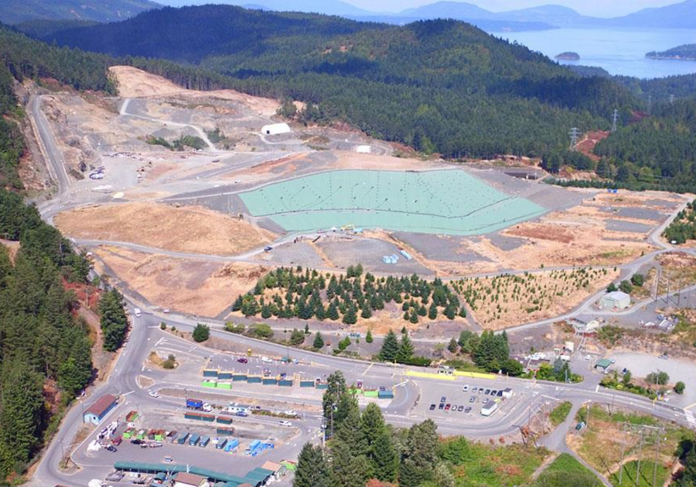A public interest group is calling out the Capital Regional District (CRD) for continually burying toxic biosolids at the Hartland Landfill, which they believe is leaking into nearby watersheds and could be polluting nearby agriculture.
The Peninsula Biosolids Coalition is heading up the effort and is comprised of a number of interested parties, including the Butchart Gardens, who work in the area to ensure environmental responsibility.
With the help of their allies in this effort, Creatively United for the Planet Society (CUPS), a video was produced which explains in depth all the issues they believe are synonymous with toxins being distributed further than intended by dumping biosolids at Hartland Landfill.
CUPS says that over 11 tons of toxic biosolids are being dumped at Hartland and could be a potential health and environmental risk if it is kept up.
“Biosolids are essentially all the retained pollutants that are associated with particles that come from our homes, industry, hospitals, universities, and the like and end up in biosolids which could be distributed on land,” said Dr. Peter Ross, Environmental Toxicologist, and a featured voice in the CUPS video.
“Understanding what’s in biosolids is the key to eliminating the problem.”
CUPS and the experts who partook in creating the video believe that the toxic biosolids and chemicals that get dumped cannot be destroyed in nature, so instead they accumulate and get dispersed through erosion and deposition.
They say that there are safer alternatives to land application of these biosolids.
Dave Cowen, CEO of the Butchart Gardens says that he and his board of directors are concerned because they are just 3.5 kilometres downstream from the landfill and they don’t want their water to be contaminated because it would affect everything they do.
“Provincial regulations do not cover, in the detail required, all of the long-term, forever chemicals that are contained in biosolids,” Cowen explained.
“What is being put in Hartland today will not just be there for my children’s life, but their children’s, children’s, children’s life.”
Cowen’s main concern is the bioaccumulation process which occurs when Butchart Gardens creates their own soil by composting everything at the gardens.
He says that the plants and flowers collect any toxins in the air and those toxins don’t break down and are therefore returned to the soil for the next generation. It is a cycle that could eventually become detrimental to the biodiversity of the Butchart Gardens.
In the video, CUPS makes several points as to what could be done differently that would help curb this bioaccumulation.
They are also concerned about new policies the CRD is considering which would allow toxic biosolids to be spread not only around the landfill, but throughout the region.
Other groups say they are concerned for the aquatic life in rivers and streams in the region as well as agricultural and food security issues.
“The best solution is the thermal conversion of biosolids into a fossil fuel free heating source,” said a CUPS spokesperson in a media release.
“This option also creates a safe and marketable product known as biochar, which can be used as a soil conditioner, providing a triple bottom line approach that encompasses economic, environmental and social values.”
Despite what some may believe, this process is not the same as incineration.
According to the organization, a process known as ‘biochar’ is a way of heating the biosolids to extreme temperatures without using fossil fuels that also is able to capture the carbon, which negates negative environmental impacts.
“Another potential benefit of thermal conversion is that it could potentially make municipal solid waste a thing of the past and stop the expansion of landfills and resulting loss and destruction of wildlife habitat and trees,” CUPS continued.
CUPS and their partners are now calling on the CRD to expedite the process to select a qualified operator of a thermal conversion plant.
Victoria Buzz reached out to the CRD for a response to CUPS’ accusations and proposed solutions, but as of this publication, they have not provided a response.
Watch the video CUPS produced below:



